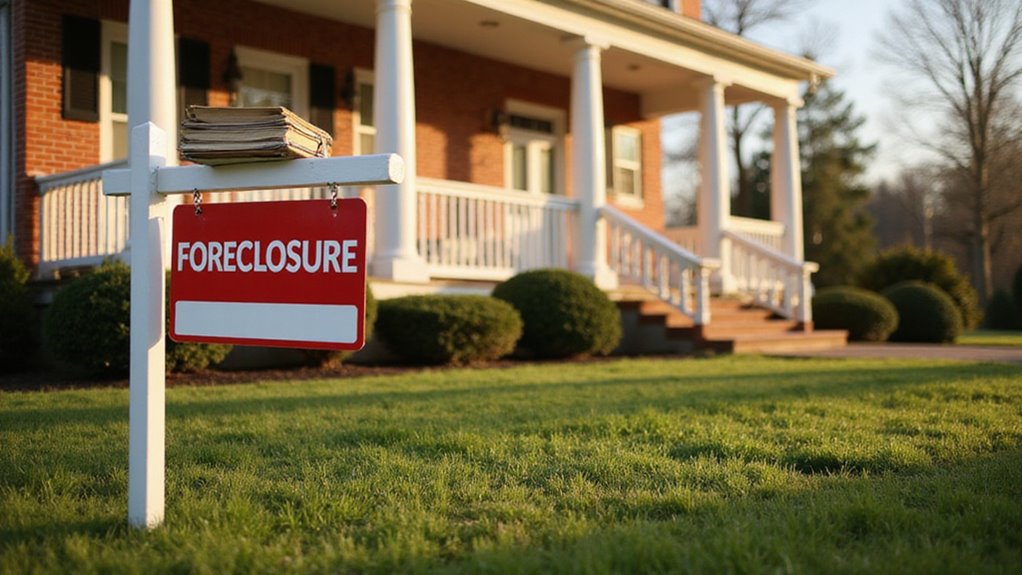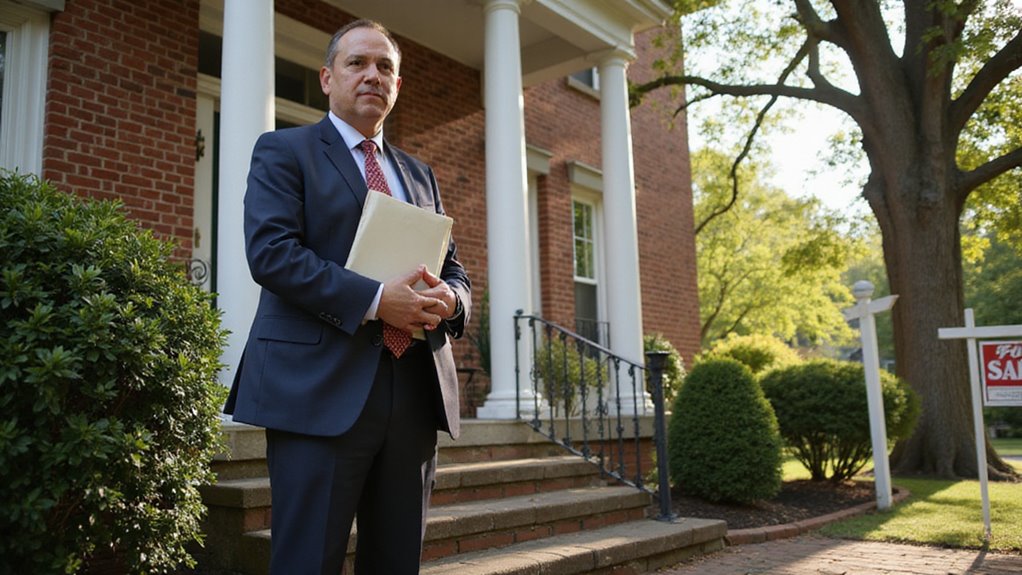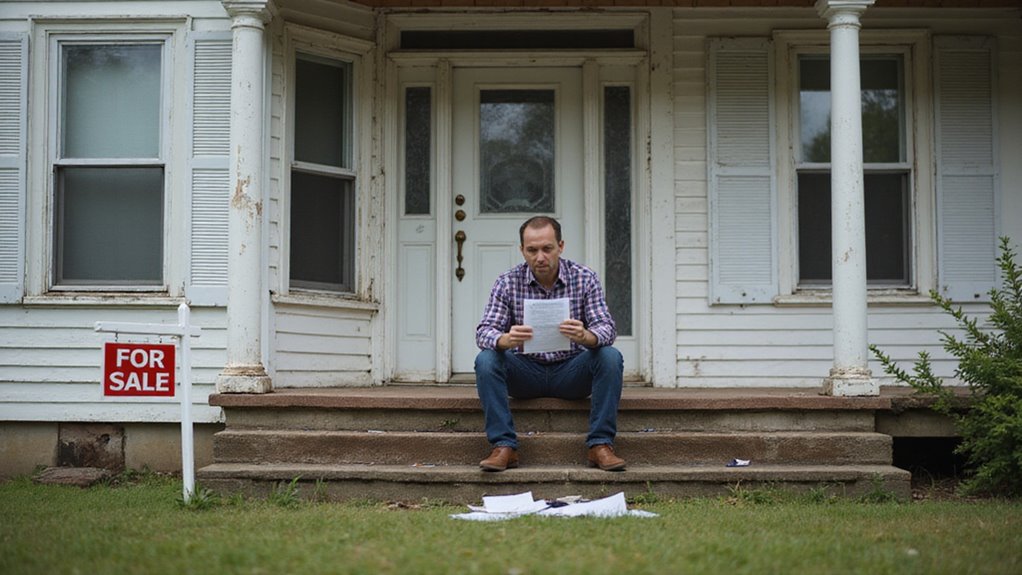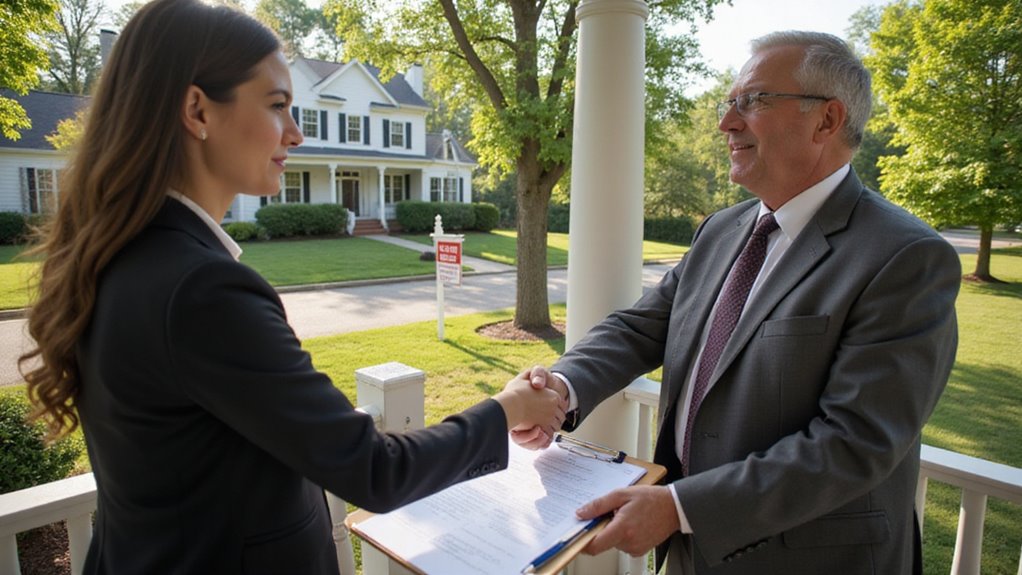Facing foreclosure on your Virginia home can feel overwhelming and stressful. You may worry about losing your investment and damaging your credit. Many homeowners wonder if they have any control left during this difficult process.
As the foreclosure date approaches, the pressure grows. You might fear running out of time and options. Every day, your financial future feels more uncertain.
Yes, you can sell a house in foreclosure in Virginia before the foreclosure sale is final. Acting quickly and understanding your rights can help you regain control. Selling your home could help you avoid foreclosure and protect your credit.
This blog will guide you step-by-step through selling your Virginia home in foreclosure and help you make smart decisions.
Key Takeaways
- Yes, you can sell a house in foreclosure in Virginia before the foreclosure process is finalized and ownership transfers at auction.
- Selling during pre-foreclosure allows you to pay off the mortgage and avoid foreclosure’s negative credit impact.
- You must disclose the foreclosure status and any material defects to potential buyers to comply with Virginia law.
- Quick sale options, such as cash home buyers or as-is sales, can help expedite the process and prevent foreclosure completion.
- Notifying your lender of your intent to sell and working with qualified professionals is essential to ensure legal compliance and smooth the sale.
Understanding Foreclosure Laws in Virginia

Virginia foreclosure laws explain how lenders can take a home if payments are missed. Most foreclosures in Virginia are nonjudicial. This means lenders do not have to go to court.
Mortgage agreements usually have a “power of sale” clause. If you fall behind on payments, the lender can start foreclosure. Lenders must give proper notice before selling your home. Acting quickly can help you take advantage of pre-foreclosure options that could stop the process and protect your rights.
You can stop foreclosure by paying the overdue amount before the sale. If you seek help early, you may be able to refinance or get counseling. These steps might help you avoid losing your home.
If you do not understand your rights, talk to a qualified attorney or counselor. They can explain your options under Virginia law. Always learn about your rights before the process starts.
Careful review of closing documents and preparation can help you avoid delays or issues if you are selling your house while it is in foreclosure.
The Foreclosure Timeline: Key Stages to Know
You need to understand the foreclosure timeline in Virginia, starting with the Notice of Default, which formally alerts you to missed payments. During the pre-foreclosure period, you still have options to resolve the debt or sell the property before it progresses. If unresolved, the process reaches its climax in a public auction and sale, transferring ownership and settling the lender’s claim.
It’s important to note that, similar to the probate process, selling a house during foreclosure in Virginia may involve addressing legal paperwork, outstanding debts, and seeking professional guidance to ensure a smooth and compliant transaction. Sellers in Broadway can benefit from guaranteed all-cash offers, which provide certainty and help expedite the sale before the foreclosure process is finalized.
Notice of Default
A Notice of Default is the first step in Virginia’s foreclosure process. Lenders send this document after you miss several mortgage payments. The notice warns you that you have broken your mortgage agreement.
The lender must state how much you owe and give a deadline to pay. Virginia law requires the lender to give proper notice before moving forward. If you receive a Notice of Default, you still have options.
You could ask your lender for a loan modification. If you qualify, this may change your payment terms. Bankruptcy may also pause the foreclosure process for a short time.
Understanding the Notice of Default is important. It officially starts the foreclosure timeline in Virginia. If you act quickly, you may be able to avoid losing your home.
Pre-Foreclosure Period
The pre-foreclosure period starts after you get a Notice of Default in Virginia. You still own your home during this time. The lender must give you 60 to 90 days to fix the problem.
You can try to change your loan terms with the lender. Selling your home before foreclosure is also an option. If you act fast, you may avoid losing your house.
Review your loan documents and note all important dates. If you need help, talk to a lawyer about your options. Bankruptcy might also be a choice if you meet certain conditions.
Auction and Sale
The foreclosure auction in Virginia starts after the pre-foreclosure period ends and all required notices are filed. The trustee leads the auction, usually at the courthouse. State law requires public advertising of the auction.
Homeowners cannot make last-minute repairs to raise the property’s value. Access to the home is limited before the auction. Bidders must research the property and estimate repair costs themselves.
If the highest bid covers your mortgage and fees, the sale moves forward. You may owe more if the bid is too low. After the auction, you must leave the home because ownership transfers to the new buyer or lender.
Types of Foreclosure Processes in Virginia
Virginia has more than one way to handle foreclosure. The main processes are non-judicial and judicial foreclosure. Each process has different steps and requirements. In many cases, selling your home as-is in Virginia is an option to consider before or during foreclosure.
Most foreclosures in Virginia use the non-judicial process. This happens when a deed of trust includes a power-of-sale clause. Lenders can sell the home without going to court.
In Virginia, most foreclosures are non-judicial, allowing lenders to sell homes without court involvement if a power-of-sale clause exists.
Judicial foreclosure is less common but may apply to certain loans. This process requires a lender to get court approval before selling the home. The court oversees the entire sale.
Strict foreclosure almost never happens in Virginia. Courts may order this if very specific conditions exist. No sale takes place; ownership simply returns to the lender.
A deed in lieu of foreclosure is another option. If you cannot pay your mortgage, you can give the home to the lender. This avoids the foreclosure process entirely.
If you’re facing foreclosure, some companies offer fast cash offers for homes in any condition, which can help you avoid the lengthy and stressful foreclosure process.
Can You Sell Your Home During Pre-Foreclosure?

You can usually sell your home in Virginia during pre-foreclosure. The house still belongs to you until the foreclosure ends. Selling early can help you avoid foreclosure on your credit record.
A lender may start pre-foreclosure if you miss mortgage payments. You can use the money from the sale to pay off your mortgage and fees. If you cannot find a buyer, you may try a loan modification. During this process, it’s important to keep your documentation organized to ensure a smooth transaction and demonstrate ownership.
The foreclosure process in Virginia is fast. Quick action gives you more options to solve the problem. If you wait too long, selling may not be possible.
Working with cash home buyers can provide a fast, as-is sale option during pre-foreclosure, helping you avoid delays and additional stress.
Notifying Your Lender of Intent to Sell
You must draft a formal notice to inform your lender of your intent to sell the property. Clearly communicate with your loan servicer, providing all required documentation and following their specific procedures. This step protects your rights and ensures compliance with Virginia foreclosure laws.
If you’re considering selling your home during foreclosure, you can benefit from a guaranteed all-cash offer that eliminates buyer financing uncertainties and streamlines the process. Consulting with a legal expert about title issues in Virginia can also help you anticipate potential challenges and ensure a smoother sale process.
Drafting a Formal Notice
A formal notice tells your lender you plan to sell your home during foreclosure. Virginia law and many mortgage agreements require this notice. Written notice helps you follow legal rules and start talks with your lender.
The notice must clearly state your plan to sell and your intended timeline. Include your full name, property address, and loan account number. If you want proof, ask the lender to confirm they received your notice in writing.
Always send this notice by certified mail with a return receipt requested. Keep copies of all letters and responses for your records. If you do this, you can protect your interests during the process.
Communicating With Loan Servicer
You should contact your loan servicer after preparing your formal notice. Tell your lender that you plan to sell your property. Provide them with your formal notice and any other important documents.
If you communicate clearly, your servicer might pause foreclosure while reviewing your request. Be ready to discuss your loan status and any past loan modification attempts. You should also mention if you have tried financial counseling.
Virginia law does not require servicers to stop foreclosure automatically. Good communication may help you work with your loan servicer. Always keep records of letters, emails, and agreements.
Ask for written confirmation of any decisions or promises made by your servicer. These records can prevent confusion later. They may also help you sell the home before foreclosure is complete.
The Role of the Trustee in Virginia Foreclosures

The trustee is a neutral party who manages the foreclosure process in Virginia. This person must follow the rules set by the deed of trust and state law. The trustee helps ensure the process is fair for both the borrower and the lender. In Virginia, trustees are also responsible for ensuring all legal and regulatory considerations related to the foreclosure are met to protect both parties from future disputes.
A trustee must send you a notice if your loan is in default. You will also get a notice about the auction date. If you receive these notices, it means the foreclosure is moving forward.
The trustee checks that all state foreclosure laws are followed. He or she will run the auction in public so everyone can see what happens. If the home is sold, the trustee pays out the money as the law requires. If you are facing foreclosure, creative financing solutions may be available to help you avoid further credit damage and sell your house quickly.
Short Sale vs. Traditional Sale: What’s the Difference?
A short sale happens when you sell your home for less than what you owe on the mortgage. A traditional sale means you sell your home for enough to pay off your loan and any liens. The main difference is whether the sale covers your full debt.
In a traditional sale, you set the price and keep any extra money after paying debts. The process is usually faster and requires less paperwork. You have more control over the sale. Pricing your home competitively and focusing on curb appeal can help you attract buyers more quickly.
A short sale needs approval from your lender because they will get less money than you owe. You must provide documents to prove you cannot pay your mortgage. This process can take more time and has stricter requirements.
If you are facing foreclosure, you should consider all your options. Loan modification or bankruptcy might help you keep your home. Always seek advice from a professional before making a decision.
When considering a short sale, it’s important to be aware of possible tax implications such as taxable income from forgiven debt.
Impact of Foreclosure on Your Credit Score

Foreclosure in Virginia will lower your credit score by 100 to 160 points. This drop makes it harder to get loans or rent a home. The foreclosure remains on your credit report for up to seven years.
Lenders may see you as a higher risk after foreclosure. If you apply for a loan, you could face higher interest rates. Insurance companies might also charge you more.
Landlords and some employers may check your credit history. If they see a foreclosure, they could decide not to work with you. Getting new credit cards may also become more difficult.
In addition, foundation issues disclosure is required by Virginia law if your home has structural problems, which could further influence a buyer’s decision during or after foreclosure.
Steps to List a Home in Foreclosure
To start listing your home in foreclosure, you’ll need to notify your lender about your intent to sell and confirm any requirements specific to your mortgage. Next, select a real estate agent with experience handling foreclosure sales in Virginia, as their expertise is crucial for legal compliance and effective marketing. Finally, work with your agent to set a competitive price that attracts buyers while satisfying your lender’s minimum payoff expectations.
Notifying Your Lender
You must tell your lender if you want to sell your home during foreclosure in Virginia. This is required by state law. Notifying your lender helps you follow the rules and may give you more time.
Send your lender a formal letter saying you plan to sell. Include your loan number and property address. Ask for a written reply from your lender.
Use certified mail or another trackable way to send your notice. Keep a copy of everything you send. This protects you if questions come up later.
If you follow these steps, you show good faith. Clear communication with your lender is important. Legal accuracy matters in every step.
Choosing a Real Estate Agent
Choosing the right real estate agent is very important if your home is in foreclosure. The agent should have experience with foreclosures and understand Virginia’s laws. This helps protect your interests and can improve your chances of selling.
You need an agent who knows about distressed properties and short sales. If the agent understands these, you are less likely to face legal issues. The agent should also be familiar with home staging and neighborhood trends.
If your agent has good staging resources, your home will look better to buyers. Strong neighborhood knowledge helps set a fair price and attracts serious buyers. Picking a qualified agent can make the sale faster and smoother.
Setting a Competitive Price
Setting a fair price is important if your home is in foreclosure. A good price attracts buyers and helps you pay off your loan. If the price is too high, your home may not sell in time.
You should work with your agent to review similar home sales in your area. This step helps you understand what buyers might pay for your home. If you price your home right, you may get more offers.
A Comparative Market Analysis (CMA) can help you decide the best price. You should also look at other foreclosure sales nearby. The home’s condition and needed repairs will affect the price.
If a lender is involved, their approval is needed before selling. Make sure you follow all legal rules for short sales. If you meet these requirements, you can avoid further problems.
Working With Real Estate Professionals
Working with a real estate professional is important when selling a home in foreclosure. An agent understands Virginia’s foreclosure process and can guide you. This helps you meet deadlines and communicate with your lender.
A good agent may suggest bankruptcy if you need more time to sell. They can also advise if refinancing your mortgage is an option. These steps could help you avoid foreclosure.
Real estate professionals know how to market your property to serious buyers. If needed, they will negotiate with lienholders on your behalf. Their help reduces the risk of mistakes and increases your chance of a quick, successful sale.
Legal Considerations When Selling During Foreclosure

You’ll need to understand how Virginia’s foreclosure laws affect your rights and timeline when selling your home. State regulations also require you to disclose the property’s foreclosure status and any known defects to prospective buyers. Failing to comply with these legal obligations can expose you to significant liability.
Understanding Virginia Foreclosure Laws
Virginia Foreclosure Laws are important if you want to sell a house in foreclosure. Virginia mainly uses a nonjudicial foreclosure process. This means the lender does not need to go to court to take your home.
The process moves quickly, so you have less time to act. You must pay property taxes, or the home could face faster foreclosure or extra liens. Home renovation costs will not stop foreclosure but may raise the house’s value.
Lenders must give you a notice of default before selling your home. You can pay the overdue amount and keep your house if you do this before the sale. Foreclosure sales happen at public auctions, and you may still owe money if the sale does not cover your loan.
Required Disclosures to Buyers
If you are selling a home in foreclosure, you must tell buyers certain facts by law. Virginia requires sellers to give specific disclosures, even if the home is in foreclosure. These rules protect both you and the buyer.
The Virginia Residential Property Disclosure Act says you must share important information. Sellers must disclose any material defects and the foreclosure status. If you do not provide this information, you risk legal trouble or lawsuits.
You should review the main disclosure requirements before selling. These include the home’s foreclosure status and any known defects. You also need to share unpaid HOA fees, legal actions, and any environmental hazards like lead or mold.
Giving accurate and timely disclosures keeps you safe from legal issues. It also helps buyers trust you during the sale. If you follow these rules, you can avoid future problems.
How to Attract Buyers for a Foreclosure Property
To make a foreclosure property attractive in Virginia’s competitive market, focus on its positive features and fix any problems. Buyers want a home that feels inviting and safe. Addressing their concerns early can help your property stand out.
A clean and staged home looks more appealing to buyers. Professional staging can highlight the best rooms and make spaces look larger. If buyers see a tidy place, they may feel more confident.
If you order a home inspection before listing, share the report with buyers. This shows you are honest about the home’s condition. Transparency can help build trust, especially with foreclosure properties.
List any repairs or upgrades in your marketing materials. Recent updates can make the property more valuable in buyers’ eyes. If you mention these improvements, buyers may worry less about future repairs.
Set a fair price based on local sales data. Foreclosure buyers look for good value and may skip overpriced homes. Competitive pricing will attract more interest from serious buyers.
Alternatives to Selling in Foreclosure
Selling your home is not your only option during foreclosure. You can try a loan modification or seek debt counseling instead. These options may let you keep your home.
A loan modification means you ask your lender to change your mortgage terms. If approved, your lender might lower your payments or add missed payments to your loan. This can make your mortgage easier to pay.
Debt counseling is another choice. A certified counselor can help you manage your finances and talk to your creditors. If you follow their advice, you might stop foreclosure and keep your credit in better shape.
Resources for Homeowners Facing Foreclosure in Virginia
Homeowners in Virginia who face foreclosure can get help from several free and low-cost resources. These services give information about your rights and steps you can take. Getting help early may improve your options.
Virginia Legal Aid offers free legal advice for people facing foreclosure. Their lawyers explain your rights and may help you in court. You should contact them if you get foreclosure notices.
HUD-approved housing counselors will guide you through foreclosure alternatives. These counselors also explain your duties, such as property upkeep. They can help you make a plan to keep your home.
Virginia Housing Development Authority provides financial counseling and loan modification programs. They also share educational materials about foreclosure and property responsibilities. You may qualify for help if you reach out soon.
The Consumer Financial Protection Bureau (CFPB) offers federal information about foreclosure and homeowner duties. They help you understand complaint processes and legal protections. Use their online tools for more details.
If you use these resources early, you can protect your home and rights. Acting quickly is important because waiting limits your options. Always follow deadlines and keep records of all steps you take.
Conclusion
If you act quickly, you can still sell your house in foreclosure in Virginia. Selling before the foreclosure is final allows you to regain some control. If you consult experts and disclose your situation, you may find the best solution for your needs.
If you choose to sell, you can consider options like working with a real estate agent or accepting a cash offer. Cash buyers can often close quickly and simplify the process. If time is short, this option may help you avoid foreclosure and its impact on your credit.
At Align Real Estate Solutions, we buy houses for cash in any condition and can help you move forward. If you need to sell your Virginia home fast, contact us today. We are here to guide you through every step and help you find relief.
Author
-

Zach Koops is co-founder and Real Estate Success Manager at Align Real Estate Solutions, serving homeowners across Virginia since 2024. With a passion for real estate and a heart for people, Zach has built his career around helping sellers navigate tough situations—foreclosure, inheritance, relocation, repair-overload—with clarity and compassion. He’s known for being straightforward, steady under pressure, and deeply invested in relationships. Outside of work, he spends his time as a husband and father, enjoys the outdoors in Shenandoah Valley, loves singing on stage, and constantly seeks growth through reading and new experiences.









